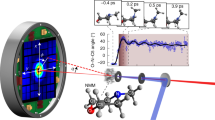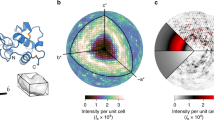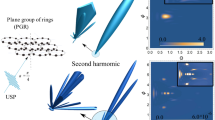Abstract
THE influence of the thermal vibrations on the diffraction of X-rays by a crystal can be represented by a distribution of scattering power in the reciprocal lattice. The theoretical formula for this is the product of two parts: one, consisting of slowly varying factors which correspond to the atomic scattering factor, the polarization factor, Debye's temperature factor, the Lorentz factor, of Laue-Bragg scattering ; the other part consisting of a function characteristic of the dynamics of the crystal vibrations, the diffusion factor d(Q). For a simple lattice the latter has the form where Ql Q2, Q3 are the co-ordinates in the reciprocal lattice, and Sαβ(Q) are the elements of the scattering matrix S, periodic functions of the Q. S can be expressed as a function of the dynamical matrix D, which is denned in terms of the coefficient matrix of the second order terms of the potential energy of the lattice. At normal temperatures one has, with a high degree of accuracy.
This is a preview of subscription content, access via your institution
Access options
Subscribe to this journal
Receive 51 print issues and online access
$199.00 per year
only $3.90 per issue
Buy this article
- Purchase on Springer Link
- Instant access to full article PDF
Prices may be subject to local taxes which are calculated during checkout
Similar content being viewed by others
Author information
Authors and Affiliations
Rights and permissions
About this article
Cite this article
BEGBIE, G., BORN, M. Thermal Scattering of X-Rays by Crystals. Nature 152, 19–20 (1943). https://doi.org/10.1038/152019a0
Issue Date:
DOI: https://doi.org/10.1038/152019a0
Comments
By submitting a comment you agree to abide by our Terms and Community Guidelines. If you find something abusive or that does not comply with our terms or guidelines please flag it as inappropriate.



